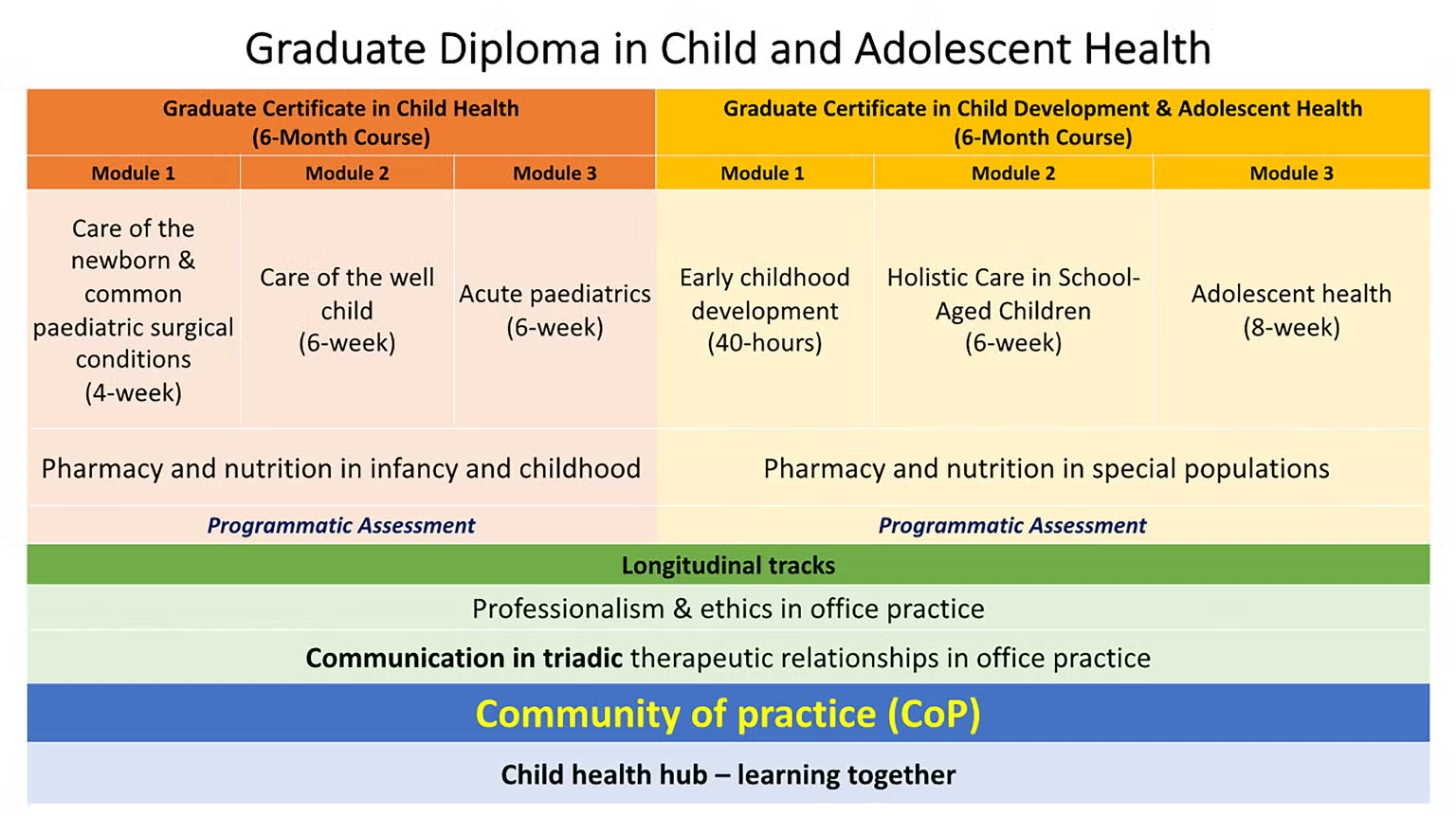PROGRAMME DATES
AY2025/2026
Graduate Certificate in Child Development and Adolescent Health: 31 January 2026 to 19 June 2026
AY2026/2027
Graduate Certificate in Child Health: 8 August 2026 to 12 December 2026
APPLICATION PERIOD
The Graduate Diploma in Child and Adolescent Health (GDCAH) consists of:
- Graduate Certificate in Child Health
- Graduate Certificate in Child Development and Adolescent Health
| Programme Type | A. Graduate Certificate in Child Health (GC1) | B. Graduate Certificate in Child Development and Adolescent Health (GC2) | Graduate Diploma in Child and Adolescent Health (GDCAH) A + B (GC 1 + GC 2) |
| Courses | Courses 1 – 3 | Courses 4 – 6 | Courses 1 – 6 |
| Registration Period | May 2026 to June 2026 (Semester 1 AY26/27) (Semester 1 AY24/25) | 06 October to 03 November 2025 (Semester 2 AY25/26) | Applicants who are interested to sign up for the Graduate Diploma, please email us directly. |
To receive exclusive updates on future registration periods and course dates, register your interest here.
*Learners are required to sign up for all 3 GC1 or 3 GC2 individual courses (CAH5101, CAH5102 and CAH5103 or CAH5104, CAH5105
and CAH5106) during the registration period.
Jointly organised by the Division of Graduate Medical Studies and the Department of Paediatrics, NUS Yong Loo Lin School of Medicine, the Graduate Diploma in Child and Adolescent Health (GDCAH) is designed to provide continued professional development for physicians (general practitioners, family physicians and community paediatricians) who are motivated to advance their clinical expertise in the delivery of child and adolescent health in the community and in their family practice.
The GDCAH intends to build a community of practice made up of community physicians serving in our primary healthcare who are driven to pursue a journey of lifelong learning to continually improve our practice in delivering care to children and adolescents. This community of practice is scaffolded by provision of longitudinal mentorship and development of an enduring, interprofessional, collaborative relationship amongst family physicians and paediatricians.
Programme Structure

The GDCAH is a 1-year part time graduate diploma programme made up of 6 academic courses (4 modular credits per course, therefore a total of 24 modular credits). Participants can choose to complete either Graduate Certificate in Child Health (comprising Courses 1 – 3) and/or Graduate Certificate in Child Development and Adolescent Health (comprising Courses 4 – 6). Participants who successfully complete the 2 Graduate Certificates are eligible to be conferred the Graduate Diploma in Child and Adolescent Health (GDCAH). Email us for details.
Programme Schedule
The Graduate Diploma in Child and Adolescent Health (GDCAH) Programme will be taking place during the following periods:
- Graduate Certificate in Child Health (Courses 1 – 3): 3 August 2024 to 14 December 2024
- Graduate Certificate in Child Development and Adolescent Health (Courses 4 – 6): 8 February 2025 to 28 June 2025
Please click here to view the detailed GDCAH schedule.
Learning Together Clinics (LTC) will be conducted once every two weeks (weekday AM/PM) or weekend (AM only).
Successful applicants may be able to choose their preferred LTC sessions based on the availability of clinic slots. More details will be shared closer to the clinic dates.
Trainers
The GDCAH faculty consists of specialists working in related fields including paediatrics, child development, adolescent medicine, family medicine, lifestyle and weight management, psychiatry and psychology, sexual health, dental, dietetics and complementary health, etc.
From Our Past Participants
“The course has been very useful, and I have definitely gained more confidence seeing paediatric cases. The faculty and trainers are so nice and encouraging too.”
|
“For those who are joining the GDCAH, my advice would be: Participate and take away valuable pearls to improve your future practice. Also build a community of physicians who you can tap on for wisdom.”
|
“This module on Acute Paediatrics is relevant for the Family Physician. I gained a lot of insight and confidence to practice and see young patients after refreshing my memory at this course and learning from the experts!”
|
For further inquiries, please contact:
For course enquiries, contact nusmedcet@nus.edu.sg
For assistance with the NUS Online Application Portal, contact lifelonglearning@nus.edu.sg

